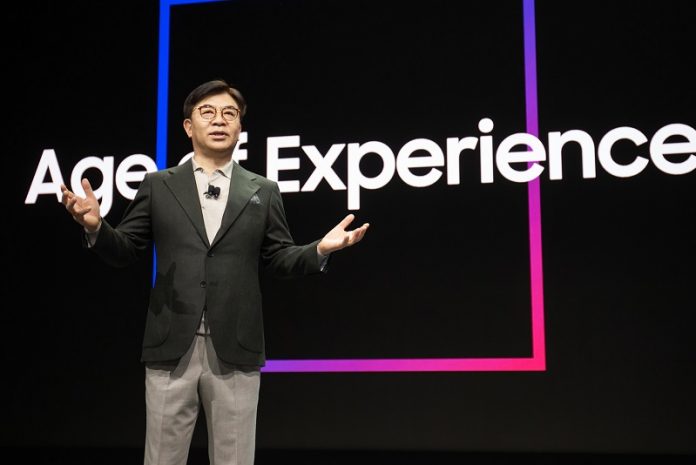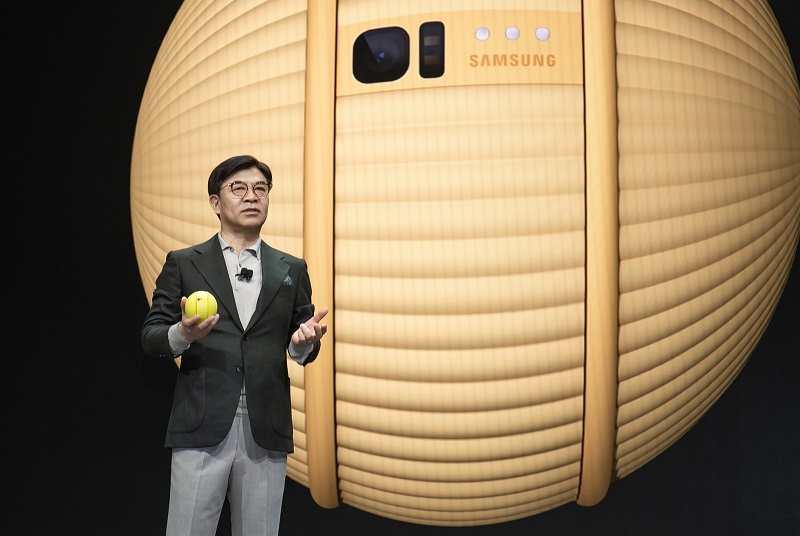Samsung showcases human-centered technologies and experiences – a personal care robot, AI-powered home of the future, and a smart city driven by IoT and 5G
Samsung Electronics announced the “Age of Experience” at the opening keynote at CES. As the featured keynote speaker, Samsung Consumer Electronics President and CEO H.S. Kim heralded a decade of human-centric innovation that seamlessly combines hardware and software to create personalized experiences that make life more convenient, more enjoyable, and more meaningful.
The Age of Experience will transform how we care for ourselves and our family, how we can customize our homes to meet our individual needs, and how we can build safer, more sustainable intelligent cities. By showcasing its latest advances in intelligent robotics, AI, 5G and edge computing, Samsung offered a glimpse into the not-so-distant future in which these technologies will come together to offer richer, more adaptive experiences for consumers.
“In the Age of Experience, we need to re-think the space we have to accommodate our diverse and evolving lifestyles,” said H.S. Kim, President and CEO of Consumer Electronics Division, Samsung Electronics. “What makes Samsung’s approach unique is the fact that we have a very clear philosophy built around human-centered innovation. We build and create to solve problems and enhance people’s lives.”

The Next Level of Personal Care
At the core of Samsung’s human-centered vision is personalized care, enhancing the health and well-being of consumers by satisfying their individual needs. During his opening remarks, H.S. Kim unveiled Samsung’s vision of robots as ‘life companions,’ and introduced Ballie, a small, rolling robot that understands you, supports you, and reacts to your needs to be actively helpful around the house.
Sebastian Seung, Executive Vice President and Chief Research Scientist at Samsung Electronics elaborated on Ballie, explaining that its On-Device AI capabilities enable it to be a fitness assistant and a mobile interface that seeks solutions for people’s changing needs. It does all this while maintaining stringent data protection and privacy standards.
“We believe AI is the future of personalized care,” stated Dr. Seung. “We see on-device AI as central to truly personalized experiences. On-device AI puts you in control of your information and protects your privacy, while still delivering the power of personalization.”
Samsung is also showcasing advanced and personalized health solutions. For example, the company has collaborated with Kaiser Permanente to develop a home-based, virtual cardiac rehabilitation solution that pairs a Samsung smartwatch with a smartphone via Bluetooth. Samsung’s HeartWise application sends reminders to the patient to exercise, collects activity data, and continuously displays the patient’s heart rate during workouts. This data is automatically uploaded via the smartphone to the patient’s chart so that clinicians, case managers and physical therapists can track the patient’s progress and engage with them accordingly.
The program enables users to partake in cardiac rehabilitation at home without taking time out of their everyday lives to travel to a hospital or medical clinic. The positive results of the home-based cardiac rehabilitation program were published in the New England Journal of Medicine (NEJM) Catalyst last year. Going forward, Samsung will continue to develop human-centric healthcare solutions that cater to the unique needs of the individuals who rely on them.
A Home Tailored to You
Samsung also offered a peek into the future home. Federico Casalegno, Chief Design Innovation Officer of Samsung Design Innovation Center, stated that the home will offer unique, immersive experiences with cutting-edge innovations like AI, sensors and data analysis: “As a living organism, the intelligent home will be a deeply personal space, tailoring experiences for each of us, according to our personal needs.”
Dr. Casalegno highlighted how spatial boundaries of the physical and digital worlds are dissolving, transforming living spaces into bespoke experience-spaces, like an art gallery, yoga studio or other forms of imaginable space. Such blurring of the two realms, according to Dr. Casalegno, is what will transform the home in the next decade.
He led the first-ever immersive demonstration involving Samsung’s GEMS (Gait Enhancing & Motivating System) technology. The demonstration showed how consumers can use AR glasses to work out with a virtual personal trainer, climb a mountain or walk underwater, from the comfort of their living room, while GEMS aggregated and analyzed results to give personalized action recommendations.
Samsung also showed how a room can be transformed with a screen like its MicroLED display, a convergence of software, AI, IoT and hardware. “A screen is not a product – it’s your window to the world, allowing you to instantly connect to your loved ones and friends as if they are in the same room,” said Dr. Casalegno, emphasizing that smart rooms can provide boundless experiences. “People can see and experience almost everything in the world and even the unknown world through the screen.”
Samsung also discussed the evolution of the modern culinary journey where appliances become cooking partners – a personal chef, nutritionist, and shopping assistant rolled into one. Intelligent and innovative technology can customize the entire food experience for consumers—from thoughtful recipe suggestions and meal planning tailored to personal preferences and what’s on-hand, to seamless grocery shopping, delivery and cooking. The company also highlighted a growing station for garden produce at home, and Bot Chef, a robotic food preparation assistant.
Safer and More Sustainable Urban Life in Smart Cities
Pointing to increasing global urbanization, Samsung outlined its smart cities vision, where intelligent systems enabled by smart devices, platforms and data,will make city life much safer and easier. Emily Becher, Senior Vice President and Head of Samsung NEXT Global, said, “We have the tools and the knowledge to create intelligent systems that make living in the city more engaging, safe, and efficient – so that our children, and their children after that can love living in their cities as much as so many of us do today.” She added, “Smart cities that utilize AI, IoT and 5G will transform how we interact with the surrounding environment in ways that maximize convenience and enjoyment”.
With IoT technology expanding its reach beyond the home to all types of buildings, Samsung’s core vision lies in saving energy, cutting down emissions and helping to achieve sustainability as populations grow.
Smart buildings will also make life more connected and convenient. For example, smart building residents will be able to call elevators, turn lights off, manage deliveries or check for parking spots with a simple swipe or voice command. Intelligent appliances installed in smart buildings will request repairs and address problems before residents even notice the issue.
In realizing the goal of creating a smart city with smart buildings, Samsung emphasized the importance of open collaboration. The company is working towards building partnerships with builders and property managers like Greystar Real Estate Partners, a leading U.S.-based global real estate developer, with which it will devise smart building solutions. “With smart buildings, the residents’ experience will get smarter, more efficient, more effective, so they utilize less energy,” said Bob Faith, Chairman and CEO of Greystar. “Samsung has the ability to bring all the technologies together and that convergence of the technologies in one place is really critical.”
Samsung also demonstrated how the combination of 5G, edge computing and AI will transform the urban transportation experience. Becher shared the company’s vision to lead the new era of vehicles, with 5G technology enabling Vehicle-to-Everything communication, which will seamlessly connect cars to the rest of the city.
Becher added that smart cities combined with 5G will be able to provide experiences unimaginable a few years ago to communities. She noted, “Faster and easier digital connection with each other will strengthen our sense of community and create entirely new forms of interaction.”
Building A Better Place for All
Concluding his 2020 CES keynote address, H.S. Kim stressed that the company is focused on using technology to create a better place for all. He highlighted three key areas of importance for the company going forward: security and privacy, technology for good, and citizenship.
Kim made clear that as an industry leader, the company’s commitment to data security and personal privacy will not waver, and that the protection of security and privacy will be a top priority as technology advances. He stated that the most important thing is putting people in control over their information, “Samsung will never share your data with third parties without prior and direct consent from you.”
He further emphasized that Samsung Knox, the company’s defense-grade security platform, will continue to expand to protect a growing array of Samsung’s devices—from mobile and TVs to home appliances and more. “We will further ensure transparent data management and transfer by advancing our data protection efforts with on-device AI, edge computing, and blockchain technology.”
Samsung also showcased how it is innovating for good, with technologies like Relúmĭno, which can help the visually-impaired see; IGNIS, a tool that helps firefighters make their jobs safer; and GEMS that helps the elderly and disabled to move.
Samsung also underscored a key pillar of its CSR vision, “Together for Tomorrow! Enabling People,” by announcing the expansion of the Samsung Innovation Campus program in 2020. Leveraging the success of the many educational programs from the last decade, Samsung Innovation Campus provides the next generation with training on the latest AI, IoT, and cloud technologies. Samsung said the campus has educated more than 20,000 students from 13 countries since its launch in 2019 and will double in size this year.
By providing education for future generations, Samsung is furthering its philosophy that technology’s purpose is to solve social problems and empower people to achieve more to make a better world.
Provided by Samsung




























